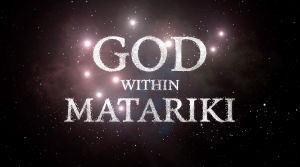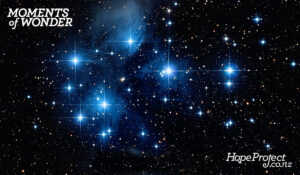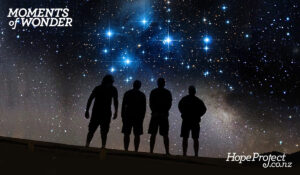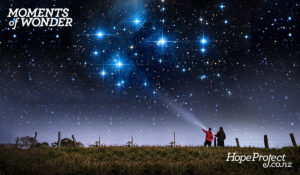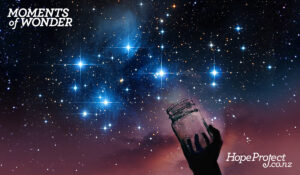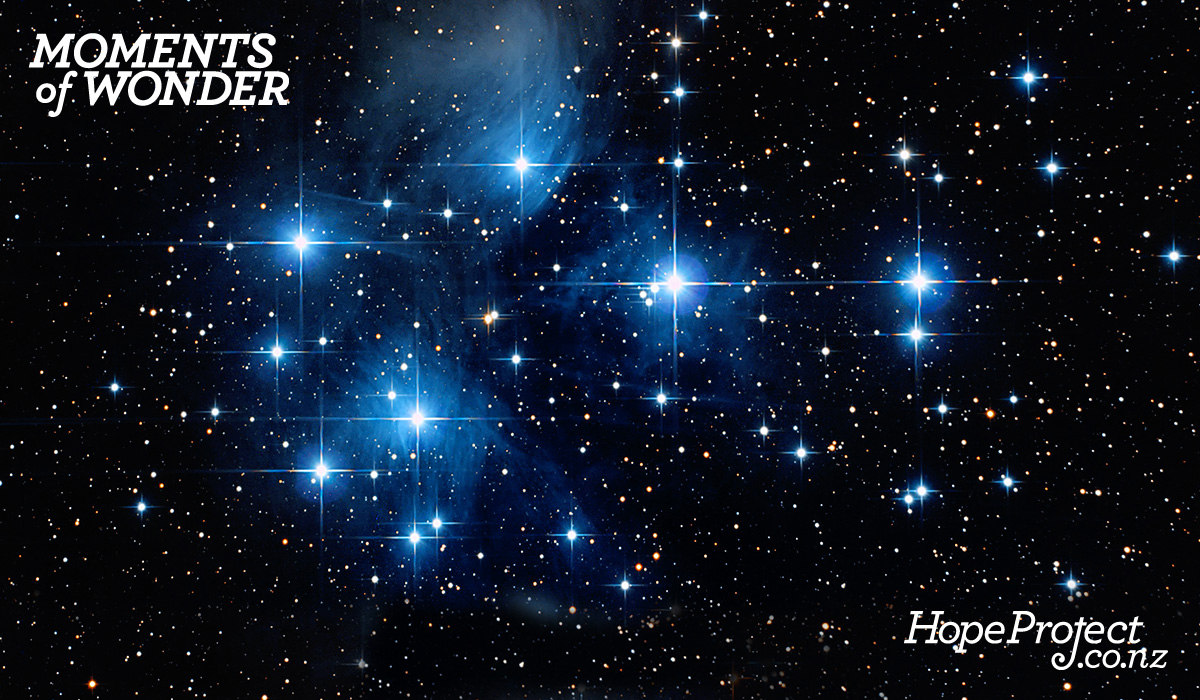
20 Jun, 2022 Matariki – What is it and how might we lean in?
Matariki: What is it and how might we lean in?
NZ has a new annual celebration and public holiday – Matariki. How could we understand and lean into this as the Christian community?
To keep this very simple: Matariki is the Māori New Year, timed by the Matariki cluster of stars reappearing in our night sky
- So, what do you logically do at new year?
- This is a time to
- Reflect on the past year,
- Celebrate the present
- Plan and look forward to the year ahead
About the star formation
Matariki has different names around the world. In English, it is called by its ancient Greek name, Pleiades or the Seven Sisters.
Re the logic of defining a new year as being in the middle of winter
For agricultural societies, it is logical to look at each new year as each new cycle of planting and harvesting crops – which makes ‘new year’ the middle of winter
- This is true of 1 January as New Year’s Day also – noting this came from the Greek calendar system in the Northern hemisphere, where 1 January is likewise the middle of winter!
In superstition and mythology
Re superstition – The stars of Matariki were also closely tied to planting, harvesting and hunting. If the stars appeared clear and bright, it signified an abundant season ahead.
Re mythology – this SUPERB video explains one version of the mythologies – Click here (4mins)
Re mythology – an excellent concise (4min) video about what Matariki is about and how we might relate to it as Christians is here – as also on the right, from Bradford Haami of Laidlaw College.
- I encourage a view (for us as people of Christian faith) that sees mythologies like this as cultural stories, purposed to pass on values. (None that I’m aware of actually believe the stars are the eyes of a god – noting stars are balls of fire). I encourage that we keep it that simple.
- Sometimes people take it further to pray to these ‘gods’. Obviously as Christians we do not participate with or encourage the worship of inanimate objects.
To note: Matariki has no single meaning or timing
In different Iwi the dates of the celebration are different – sometimes for a week, sometimes for a month. The customs and meaning associated with it vary also – except for the central thread that it is the new year, so we (1) look backwards with thankfulness remembering those who have gone before, (2) gathering to celebrate with loved ones today – while (3) looking (or planning) forward with hope to the future.
The celebration explained in simple form – with a Christian understanding
Jade Hohaia has created an amazing approx 4min video with Lorinda Pereira, an amazing Māori leader in Northland, explaining what Matariki means to her in her hapu, and as a Christian. Click here.
The images to the right show you how we are doing this in our own FaceBook posts. Freely use these.
The text we are putting out with images (see images on the right) on FaceBook is as follows (freely copy, paste / edit):
Possible text for a social media post.
IT’S A COMMON EXPERIENCE to gaze up at the stars and to feel a sense of ‘awe’ and ‘wonder’. With the arrival of Matariki as a national holiday here in Aotearoa New Zealand, let’s explore some of what this brings to us. As a family of stars, we may consider what it means to be ‘community’ together – with two thoughts coming from Te Reo Māori being…“Matariki ahunga nui” (Matariki brings us together) & “Matariki whiria te tangata” (Matariki weave the people together). But Matariki also invites us to reflect on the past year, to celebrate the present, and to plan for the year ahead, as a New Year celebration. All-the-while to carry a sense of hope. There’s a Bible verse that reflects on this … “When I consider your heavens, the work of your fingers, the moon and the stars, which you have set in place, what is mankind that you are mindful of them, human beings that you care for them?… Lord, our God, how majestic is your name in all the earth!” Psalm 8:3-4/9. You can explore other hope stories here: https://hopeproject.co.nz
In terms of the cultural values Matariki will likely take on here in NZ
- An esteeming of things-Maori as a part of the mix of who we are as New Zealanders, is certainly the overarching point of having this new public holiday
- Remembrance – Honouring those we have lost since the last rising of Matariki
- Celebrating the present with loved ones – Gathering together to give thanks for what we have
- Looking to the future – Looking forward to the promise of a new year
- Commercialism – As much as some will protest this, shops will naturally leverage the long weekend – just as has also happened to Christmas and Easter.
Addressing negativity toward this from individuals
Various objections have certainly been in our social media. The following paragraph summarises a possible response to a few issues – to give you some wording or thoughts.
Some will feel no connection to Matariki as New Zealanders. Christians will also feel understandably uncomfortable when discovering there are pagan religious elements connected with this festival. To comment on this, the feeling of disconnect is because we aren’t familiar with the history of Matariki. This festival hasn’t been a part of our tradition. It’s worth considering why our Government made this decision though. Following Te Tiriti, a Government was set up that disregarded Māori, even while they were the majority of the population. Various European festivals made it onto our national calendar – eventually inclusive of public holidays, but no Māori festivals at all. To note it, Waitangi isn’t a Māori festival. It’s for all New Zealanders. The Treaty / Te Tiriti is arguably more for non-Māori than Māori, in that it is what gave our non-Māori ancestors legal right to live in these lands. To recognise this injustice, just one (not five) Māori festivals was chosen – to be included in our annual calendar. More than being about pulling people together, this is first and foremost about a value. We are wise to recognise this is a good value, even though the pagan associations connected to Matariki (any worship of objects / created things) is not for us as Christians. Regarding idolatry, we believe all people should worship their Creator – not his creation. Our response could, however, be no different to an atheist celebrating Christmas with their family, or myself during Hari Haya with Muslim friends, or during Deepavali with Hindu friends when living in Asia… We engage in relationship and in community with others, while refraining from participating in any spiritual dynamics that we think are untrue. It is about tolerance., and it doesn’t have to be viewed as a big issue – despite clear differences on this matter. In truth, this type of engagement is already the case for the majority of New Zealanders at Easter and Christmas annually. So it certainly can’t hurt if we extend the same grace in this instance – while at all times remaining true to ourselves and our beliefs. There much good within this festival. There is, in fact, an opportunity to learn an entire way of thinking and learning, preserving knowledge as an oral society related to history, values and agriculture… …through stories – connected with stars that were looked upon every night and therefore well known, in a society that somehow survived without electricity, TVs or smartphones!
Practices that might fit the occasion
In noting there is a public holiday given with this – there is TIME to consider a community activity, whether within a church community, or in the wider (geographic) community.
Building fires, singing songs and telling stories are apt applications. In the church:
- Give thanks to God for events of the past months and year – and for God’s provision for needs.
- Tell stories of those who have gone before us – living by faith, bringing blessing to our nation. They are role models!
- Gather with whanau / with loved ones / community around food and celebration
- Look to the future to see where hope and opportunity might lie
“When I consider your heavens, the work of your fingers, the moon and the stars, which you have set in place, what is mankind that you are mindful of them, human beings that you care for them?… Lord, our God, how majestic is your name in all the earth!” Psalm 8:3-4/9.
LINKS
FREE ONLINE BOOK: A fantastic concise book which explores the topic, ‘A Christian looks at… Matariki‘ by Michael L Drake. It covers these three topics, 1. Surprised by Matariki? 2. Matariki for Christians? 3. A Biblical Matariki
ARTICLE: A great article looking at ‘Christians, Matariki, and the First Commandment‘
by (Drs) Malcolm Falloon, Stuart Lange, and Jay Mātenga
(2024) A great video produced by Shine TV looking at the celebration of Matariki. What does the Bible say about this time in our Kiwi calendar, and how do we navigate the celebrations and complexities of this season as Christian communities?. Theologian Dr Brad Haami and church leaders help us look up and see where our creator God is within the stars of Matariki.
(2023) Dr Brad Haami created this excellent short video explaining what Matariki is about – including the idolatry / worship of stars, giving a perspective on how we respond to this new national festival (and public holiday) as Christians.
(2022) Jade Hohaia has created an amazing video with Lorinda Pereira, explaining what Matariki means to her in her hapu, and as a Christian.
This video explains one version of the mythologies. Interestingly the idea of separation, pain and hope (because the stars still look down) can sit within this. These are realities we understand globally.
Images to use
Matariki Stories
Matariki Event @ New Lynn Bible Chapel
``Glow stick`` sleep over for Sunday School
Matariki Resources
Other blogs by Dave Mann on this general topic
(From oldest to newest)
- 2017 – A reason to celebrate Waitangi Day!
- 2017 – Article – Biculturalism – more important than most think
- 2017 – New illustrated Treaty of Waitangi series launched
- 2018 – Article – Te Tiriti of Waitangi – How to overcome bicultural mistrust
- 2018 – Article – A vision of our bicultural future
- 2019 – Article – The need to keep our bicultural story honest
- 2019 – Article – How to ensure de-colonisation doesn’t become de-Christainisation
- 2019 – New illustrated NZ history story for ages 4 to 7, titled The First Kiwi Christmas
- 2020 – Toward a reconciling of the Maori and Pakeha church (What happened and what can we do?)
- 2021 – Bicultural or multi-cultural (some terminology for our conversations)
- 2021 – Overcoming threats to the bicultural journey of the New Zealand Church
- 2021 – Why and how local church leaders could engage better with local Māori
- 2022 – An observable process in reconciliation of Māori with the wider Church
- 2022 – Matariki – What it is, and how we might ‘lean in’
- 2023 – God in our history (A journey to work to preserve)
- 2023 – Values not vindication (The solution for poor wellbeing outcomes is in values – not the Treaty)
5 self-print bulletin-booklets for your church
- Called ‘Then and Now’ – about outreach and our early bicultural story, to give to church members with the bulletin over a 5 week period here (These booklet also encourager support of the Hope Project – which takes some of these stories to the public square).
An easy-to-read option to educate yourself, elders, children’s and youth leaders – and then all members (children, youth and adults)
- Consider the illustrated novel series: ‘The Chronicles of Paki – Treaty of Waitangi Series’. These can be found at BigBook.nz. View a blog with displaying some of its endorsements here.
Waitangi weekend sermon outlines (free)
- ‘Three Treaties’ (Gibeonites, Waitangi and Jesus) from Dave Mann is (word doc) here, with power point here
- Waitangi Weekend sermon – ‘Leaving a legacy’ – edited – with thanks to Keith Harrington (word doc) here
- Waitangi Weekend sermon – ‘Joshua and the Treaty (five treatise)’ – edited – with thanks to Keith Harrington (word doc) here
The Te Reo Pulpit Challenge
- Click here.
DAVE MANN. Dave is a creative communicator with a vision to see an understanding of the Christian faith continuing, and also being valued, in the public square in Aotearoa-New Zealand. He has innovated numerous conversational resources for churches, and recently coordinated a 5th nationwide multimedia Easter project purposed to help open conversation between church and non-church people about Christianity take place, including regarding the specifically Christian origins of many of our nation’s most treasured values. Dave is the author of various books and booklets including “Because we care”, “That Leaders might last”, “The Elephant in the Room”, and available for free on this site: “The What and How of Youth and Young Adult ministry”. Married to Heather, they have four young boys and reside in Tauranga, New Zealand.




